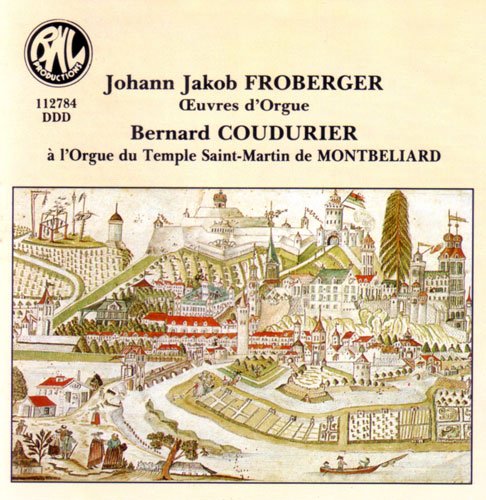Baroque composer, keyboard virtuoso, and organist.
Among the most famous composers of the era, Johann Jakob Froberger (baptized 19 May 1616 – 7 May 1667) was influential in developing the musical form of the suite of dances in his keyboard works. His harpsichord pieces are highly idiomatic and programmatic.
Only two of Froberger’s many compositions were published during his lifetime. Froberger forbade publication of his manuscripts, restricting access to his noble patrons and friends, particularly the Württembergs and Habsburgs who had the power to enforce these restrictions. After his death the manuscripts went to his patroness Sibylla, Duchess of Württtemberg (1620–1707) and the music library of the Württemberg family estate.
Source: The BBC artist page for Johann Jakob Froberger.
In 1637 Basilius Froberger, his wife and one his daughters died of plague. Johann Jakob and his brother Isaac sold their father’s music library to the Wurttemberg court (this is how the contents of Basilius’ library became known – through the court archives); the same year Johann Jakob became court organist in Vienna, assisting Wolfgang Ebner. In June he was granted a leave and a stipend to go to Rome to study under Frescobaldi.
Froberger is usually credited as the creator of the Baroque suite. While this may be misleading, French composers of the time did group dance pieces by tonality above all, and while other composers such as Kindermann did try to invent some kind of organisation, their dances did not attain as high a degree of artistic merit as seen in Froberger’s suites. The typical Froberger suite established allemande, courante, sarabande and gigue as the obligatory parts of a suite. However, there is some controversy surrounding the placement of the gigue. In Froberger’s earliest authenticated autograph, Libro Secondo, five out of six suites are in three movements, without the gigue. A single suite, no. 2, has a gigue added as a 4th movement (and a later copy adds gigues to suites nos. 3 and 5). The suites of Libro Quarto all have gigues as the 2nd movement. The order that became the standard after Froberger’s death, with the gigue being the last movement, first appeared in a 1690s print of Froberger’s works by the Amsterdam publisher Mortier.
burgher (n.)
1560s, “freeman of a burgh,” from Middle Dutch burgher or German Bürger, from Middle High German burger, from Old High German burgari “inhabitant of a fortress,” from burg “fortress, citadel” (from PIE root *bhergh- (2) “high,” with derivatives referring to hills and hill-forts). Burgh, as a native variant of borough, persists in Scottish English (as in Edinburgh).
bhergh-1 To hide, protect. Oldest form *bherg̑h‑, becoming *bhergh‑ in centum languages.
- Zero-grade form *bhr̥gh‑.
[Pokorny bherg̑h‑ 145.]
bhergh-2
High; with derivatives referring to hills and hill-forts. Oldest form *bherg̑h‑, becoming *bhergh‑ in centum languages.
Derivatives include iceberg, bourgeois, burglar, force, and fortify.
- belfry, from Old French berfroi, tower, from Germanic compound *berg-frij‑, “high place of safety,” tower (*frij‑, peace, safety; see prī-).
- Zero-grade form *bhr̥gh‑.
- borough, burg, from Old English burg, burh, byrig, (fortified) town;
- burgomaster, from Middle Dutch burch, town;
- bourg, bourgeois, burgess, burglar; faubourg, from Late Latin burgus, fortified place, and Old French burg, borough;
- burgher, from Old High German burgāri, townsman, from Germanic compound *burg-warōn‑, “city protector” (*warōn‑, protector; see wer-4). a-d all from Germanic *burgs, hill-fort.
- Possibly suffixed zero-grade form *bhr̥gh-to‑. force, fort, fortalice, forte1, forte2, fortis, fortissimo, fortitude, fortress; comfort, deforce, effort, enforce, fortify, panforte, pianoforte, reinforce, from Latin fortis, strong (but this is also possibly from dher-).
[Pokorny bhereg̑h‑ 140.]

